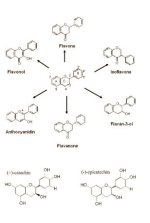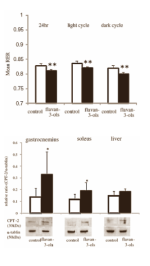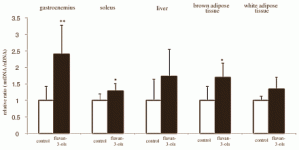Cacao Boosts Fat Burning
If you make sure you’re consuming fewer kilocalories than you’re burning, you might be able to lose weight faster by taking a couple of tablespoons of cacao powder each day. We base this bold statement on a Japanese animal study, published in Lipids in Health and Disease.
Cacao powder is packed with flavonoid compounds, and the flavonoids that scientists rave about most are the flavan-3-ols, and in particular the flavan-3-ol (-)-epicatechin is likely to hold their interest.
Animal studies suggest that (-)-epicatechin imitates and reinforces the positive effects of exercise. Lab animals build up condition faster when given (-)-epicatechin. Lab animals that are not allowed to exercise remain fit for longer when given (-)-epicatechin.
Fat burning
One effect of exercise is that your muscles start to burn more fat. The Japanese researchers wanted to know whether flavan-3-ols imitate this effect too, so they gave mice a dose of flavan-3-ols from cacao every day for two weeks.
The researchers put the flavan-3-ols in the mice’s drinking water. A control group was given drinking water with nothing added to it.
We are not a hundred percent sure what the human equivalent would be of the dose that the Japanese used. But with a bit of guesswork we reckon that you’d consume the amount of (-)-epicatechin and (+)-catechin they used if you had 2-4 tablespoons of a phenol-rich cacao powder daily.
If you’re planning on experimenting, use raw cacao. This contains more active ingredients that other powders. It’s available in all health food shops and also in some supermarkets.
Administration of the flavan-3-ols lowered the resting respiratory exchange ratio. Simply put, this means that the mice burned more fat.
The cacao flavonoids boosted the synthesis of enzymes involved in fat burning, such as carnitine palmitoyltransferase 2 [CPT-2] and medium-chain acyl-CoA dehydrogenase, in the muscles, liver and brown fat cells.
In addition, the cells in the muscles, fat and liver started to make more mitochondria as a result of the flavan-3-ols. These convert nutrients into energy.
Conclusion
The mice didn’t exercise and ate as much as they wanted to. The flavan-3-ols didn’t lead to weight loss, but if the researchers had put the mice on a diet or had let them exercise, then the result would probably have been different.
Flavan-3-ol fraction from cocoa powder promotes mitochondrial biogenesis in skeletal muscle in mice.
Abstract
BACKGROUND:
Numerous clinical studies have reported that ingestion of chocolate has reduced risk of metabolic syndrome. In order to elucidate the mechanism, we evaluated the influence of flavan-3-ols derived from cocoa powder on energy metabolism in mice using an indirect calorimetric method.
METHOD:
The mice were divided into two groups, and administered either distilled water or 50 mg/kg of flavan-3-ol fraction for 2 weeks. At the end of the experimental period, animals were sacrificed after blood pressure and the mean respiratory exchange ratio (RER) over 24 hours were measured.
RESULTS:
The mean respiratory exchange ratio (RER) over 24 hours was reduced significantly in the flavan-3-ols group. The mean blood pressure was significantly decreased in flavan-3-ols treatment group compared with control group. The protein level of carnitine palmitoyltransferase 2 (CPT2) was increased significantly by flavan-3-ols in skeletal muscle, but not in liver. Uncoupling protein (UCP) 1 was increased significantly in brown adipose tissue by flavan-3-ols. The mitochondria copy number in gastrocnemius and soleus muscles and brown adipose tissue were increased significantly by administration of flavan-3-ol fraction.
CONCLUSION:
These results suggest that flavan-3-ols enhances lipolysis and promotes mitochondrial biogenesis. We conclude that improvement of metabolic syndrome risk factors following ingestion of chocolate may be induced, in part, by the mitochondrial biogenesis-promoting effect of flavan-3-ols.
If you make sure you’re consuming fewer kilocalories than you’re burning, you might be able to lose weight faster by taking a couple of tablespoons of cacao powder each day. We base this bold statement on a Japanese animal study, published in Lipids in Health and Disease.
Cacao powder is packed with flavonoid compounds, and the flavonoids that scientists rave about most are the flavan-3-ols, and in particular the flavan-3-ol (-)-epicatechin is likely to hold their interest.
Animal studies suggest that (-)-epicatechin imitates and reinforces the positive effects of exercise. Lab animals build up condition faster when given (-)-epicatechin. Lab animals that are not allowed to exercise remain fit for longer when given (-)-epicatechin.
Fat burning
One effect of exercise is that your muscles start to burn more fat. The Japanese researchers wanted to know whether flavan-3-ols imitate this effect too, so they gave mice a dose of flavan-3-ols from cacao every day for two weeks.
The researchers put the flavan-3-ols in the mice’s drinking water. A control group was given drinking water with nothing added to it.
We are not a hundred percent sure what the human equivalent would be of the dose that the Japanese used. But with a bit of guesswork we reckon that you’d consume the amount of (-)-epicatechin and (+)-catechin they used if you had 2-4 tablespoons of a phenol-rich cacao powder daily.
If you’re planning on experimenting, use raw cacao. This contains more active ingredients that other powders. It’s available in all health food shops and also in some supermarkets.
Administration of the flavan-3-ols lowered the resting respiratory exchange ratio. Simply put, this means that the mice burned more fat.
The cacao flavonoids boosted the synthesis of enzymes involved in fat burning, such as carnitine palmitoyltransferase 2 [CPT-2] and medium-chain acyl-CoA dehydrogenase, in the muscles, liver and brown fat cells.
In addition, the cells in the muscles, fat and liver started to make more mitochondria as a result of the flavan-3-ols. These convert nutrients into energy.
Conclusion
The mice didn’t exercise and ate as much as they wanted to. The flavan-3-ols didn’t lead to weight loss, but if the researchers had put the mice on a diet or had let them exercise, then the result would probably have been different.
Flavan-3-ol fraction from cocoa powder promotes mitochondrial biogenesis in skeletal muscle in mice.
Abstract
BACKGROUND:
Numerous clinical studies have reported that ingestion of chocolate has reduced risk of metabolic syndrome. In order to elucidate the mechanism, we evaluated the influence of flavan-3-ols derived from cocoa powder on energy metabolism in mice using an indirect calorimetric method.
METHOD:
The mice were divided into two groups, and administered either distilled water or 50 mg/kg of flavan-3-ol fraction for 2 weeks. At the end of the experimental period, animals were sacrificed after blood pressure and the mean respiratory exchange ratio (RER) over 24 hours were measured.
RESULTS:
The mean respiratory exchange ratio (RER) over 24 hours was reduced significantly in the flavan-3-ols group. The mean blood pressure was significantly decreased in flavan-3-ols treatment group compared with control group. The protein level of carnitine palmitoyltransferase 2 (CPT2) was increased significantly by flavan-3-ols in skeletal muscle, but not in liver. Uncoupling protein (UCP) 1 was increased significantly in brown adipose tissue by flavan-3-ols. The mitochondria copy number in gastrocnemius and soleus muscles and brown adipose tissue were increased significantly by administration of flavan-3-ol fraction.
CONCLUSION:
These results suggest that flavan-3-ols enhances lipolysis and promotes mitochondrial biogenesis. We conclude that improvement of metabolic syndrome risk factors following ingestion of chocolate may be induced, in part, by the mitochondrial biogenesis-promoting effect of flavan-3-ols.



